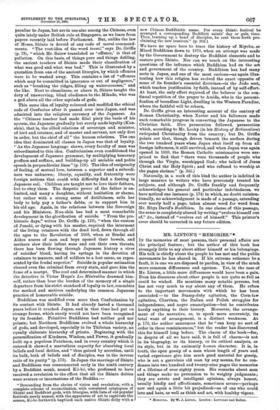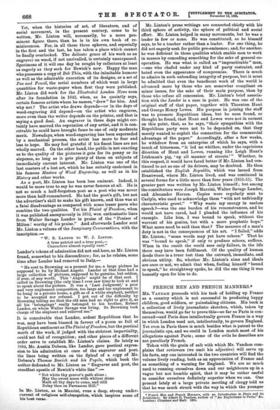MR. LINTON'S " MEMORIES."* IN the memories of most persons,
their personal affairs are the principal feature ; but the author of this book has strangely little to say about either himself or his belongings.
His talk is chiefly about the people he has met and the public movements he has shared in. If his extreme reticence be a fault, it is one we are disposed to pardon, in view of the much more common diffuseness and egotism. Yet, in the case of Mr. Linton, a little more diffuseness would have been a gain.
Even his discourse about other people is not quite so full as could be wished. He mentions many notable persons, but has not very much to say about any of them. He refers to the important movements with which he has been associated — to the Stamp-duty agitation, the Corn-law agitation, Chartism, the Italian and Polish struggles for independence, and negro emancipation—but he contributes hardly anything to their history. Moreover, the arrange- ment of the narrative, or, to speak more accurately, its total want of arrangement, is a distinct weakness. At p. 176, the author announces that he "can keep no sort of order in these reminiscences," but the reader has discovered this for himself long before. The charm of the book—for, in despite of all we have said, it is fall of charm—is not in its biography, or its history, or its critical analysis, or its style, but in its eminently human character. It is, in truth, the open gossip of a man whose length of years and varied experience give him much good material for gossip, who is not a garrulous old man by any means, for he con- denses into two hundred and twenty-nine pages the memories of a lifetime of over eighty years. His remarks about men and things make no pretension to be weighty judgments ; they are astute and intelligent opinions, always honest, usually kindly and affectionate, sometimes severe—perhaps now and again a little bit prejudiced—as of one who could love and hate, as well as think and act, with healthy vigour.
• Memorims. By W. J. Linton. London: Lawrence and Bunco.
Yet, when the histories of art, of literature, and of social movement, in the present century, come to be written, Mr. Linton will, necessarily, be a more pro- minent figure there, than he is in his own book of re- miniscences. For, in all these three spheres, and especially in the first and the last, he has taken a place which cannot be finally overlooked. The delicate grace of his work as an engraver on wood, if not unrivalled, is certainly unsurpassed. Specimens of it will one day be sought by collectors at least as eagerly as they seek for Bewick's now. Happy the man who possesses a copy of Bob Thin, with the inimitable humour as well as the admirable execution of its designs, or a set of Pen and Pencil, the serial numbers of which went in large quantities for waste-paper when first they were published. Mr. Linton did work for the Illustrated London News soon after its foundation in 1842, when, as he quaintly says, certain famous artiste whom he names," drew" for him. And why not ? The artist who draws depends—or in the days of wood-engraving did depend—on the artist who engraves, more even than the writer depends on the printer, and that is saying a good deal. An engraver in those days might cer- tainly have marred the reputation of any artist, and it is con- ceivable he could have brought fame to one of only moderate merit. Nowadays, when wood-engraving has been superseded by a mechanical process, the artist has more to fear and less to hope. He may feel grateful if his finest lines are not wholly marred. On the other hand, the public is not exacting as to the quality of the pictures it gets for its penny or its sixpence, so long as it gets plenty of them on subjects of immediately current interest. Mr. Linton was one of the last masters of a lost art, which he has suitably enshrined in his famous Masters of Wood Engraving, as well as in his History and other works.
As a poet, Mr. Linton has been less eminent. Indeed, it would be more true to say he was never famous at all. He is not so much a half-forgotten poet as a poet who was never more than half-remembered. He had the poet's gift, but not the advertiser's skill to make his gift known, and thus was at a fatal disadvantage as compared with some lesser poets who combine the two qualities. Yet his Plaint of Freedom, when it was published anonymously in 1852, won enthusiastic lines from Walter Savage Landor in praise of the "Praiser of Milton ! worthy of his praise." And afterwards Landor sent Mr. Linton a volume of the Imaginary Conversations, with the inscription :— " W. S. LANDOR TO W. J. LINTON. A true patriot and a true poet,— Characters almost equally rare."
Landor's tokens of admiration did not end here, as Mr. Linton found, somewhat to his discomfiture; for, as he relates, some time after Landor had removed to Italy,—
" He sent to Browning as a present for me, a large picture he supposed to be by Michael Angelo. Landor at that time had a large collection of pictures, supposed to be genuine, but seldom, if ever, of any worth. This Angelo' might be of that sort. I called on Browning (the only time I ever saw him) to look at and to speak about the picture. It was a Last Judgment,' a poor and very unpleasant composition, too large and too unpleasant to be hung in a private house, a gift as of a white elephant, neither to be accepted nor refused. I got out of the difficulty by Browning telling me that the old man had no right to give it, as all his 'belongings' really belonged to his brother, Robert Landor, on whom Walter Savage was living. So Browning took charge of the elephant and relieved me."
It is conceivable that Landor, ardent Republican that he was, may have been biassed in favour of a poem so fall of Republican sentiment as The Plaint of Freedom, but the poetical merit of the work, if judged with the strictest impartiality, could not fail of recognition; and other pieces of a different order serve to establish Mr. Linton's claims. So lately as 1884, Mr. Austin Dobson, like Lan dor, gave poetical expres- sion to his admiration at once of the engraver and poet,
the lines being written on the flyleaf of a copy of Mr. Dobson's Thomas Bewick and his Pupils, which book the author dedicated to Mr. Linton as "Engraver and poet, the steadfast apostle of Bewick's white line" "Not white thy graver's path alone ; May the sweet muse with whitest stone Mark all thy days to come, and still Delay thee on Parnassus Hill."
In Mr. Linton, as in Mazzini, runs a deep, strong under- current of religions self-abnegation, which inspires some of his best verse. Mr. Linton's prose writings are connected chiefly with his third sphere of activity, the sphere of political and social effort. Mr. Linton helped in many movements, but he was a leader in few or none. He was constituted, as he himself says, to be a teacher rather than a leader. For one thing, he did not eagerly seek for public pre-eminence; and, for another, he was deficient in those qualities which enable men to work in masses by conceding something for the sake of general co-
operation. He was what is called an " impracticable " man, —one who chafed under any kind of party restraint, and bated even the appearance of compromise. There is much to admire in such unbending integrity of purpose, but it must be admitted that even the beneficent work of the world is advanced more by those who are somewhat compliant on minor issues, for the sake of their main purpose, than by those who refuse all concession. Mr. Linton's brief associa- tion with the Leader is a ease in point. He was one of the original staff of that paper, together with Thornton Hunt and George Henry Lewes. His purpose in joining the staff was to promote Republican ideas, but he soon found, or thought he found, that Hunt and Lewes were not in earnest on this point, that, as he says, "their sympathies with the Republican party were not to be depended on, that they merely wanted to exploit the connection for the commercial advantage of the paper." Accordingly, after a few weeks, he withdrew from an enterprise of which he says, with a touch of bitterness, "it led no whither, under the capricious direction of Hunt and Lewes, running like Leigh Hunt's Irishman's pig, up all manner of streets.'" Whether, in this respect, it would have fared better if Mr. Linton had con- tinued to act as one of its drivers, may be doubted. He then established the English Republic, which was issued from Brantwood, where Mr. Linton lived, and was continued in several forms for a little more than four years (1851-55). The greater part was written by Mr. Linton himself; but among the contributors were Joseph Mazzini, Walter Savage Landor, and Alexander Herzen. Copies were regularly sent to Carlyle, who used to acknowledge them "with not unfriendly characteristic growl." "Why waste my energy in useless speech ?—was the one burden of his remonstrances, and he would not have cared, had I pleaded the influence of his example. Like him, I was bound to speak, without the warrant of his genius, but with a more prophetic hope." What more need be said than that ? The measure of a man's duty is not in the consequences of his act. "I failed," adds Mr. Linton ; "some words may yet have echoes." That he was "bound to speak," if only to produce echoes, suffices. When in the result the world sees only failure, in the life there may have been fulfilment. Of the quality of human deeds there is a truer test than the outward, immediate, and obvious utility. So, whether Mr. Linton's aims and ideals are ours or not, we admit that when, feeling himself "bound to speak," he straightway spoke, he did the one thing it was honestly open for him to do.



















































 Previous page
Previous page